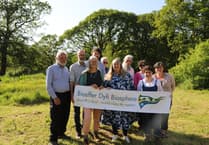People across Wales are being asked their views on the potential reintroduction of beavers in the wild.
A team of experts from the University of Exeter, are running a public survey to gauge public opinion over the potential release of beavers into suitable locations in Wales.
Beavers had been hunted to extinction in Britain almost 500 years ago, but have successfully been reintroduced to the wild in both Scotland and England in recent years. Now, the Welsh Beaver Project, led by North Wales Wildlife Trust, is seeking to re-establish beavers in Wales.
The University of Exeter is undertaking an independent public survey to explore views held by residents in Wales about beavers living in the wild.
The survey will help understand attitudes to the return of beavers to the Welsh countryside, how respondents feel about beaver management techniques, and how attitudes may differ between groups of people.
Results will be presented in a summary report to be shared with Natural Resources Wales and North Wales Wildlife Trust, before being made publicly available later this year.
Dr Roger Auster, of the University of Exeter, said: “With discussions taking place about beavers living wild in Wales, it is important to consider the views of people who live there. This survey is a great opportunity to gain insight into opinions held in Wales, and identify if and how attitudes may vary.”
All residents in Wales are invited to take part. The survey will take approximately 10 to 15 minutes to complete, and can be completed in either Welsh or English.
This research is commissioned by North Wales Wildlife Trust with funding received through the Welsh Government Rural Communities – Rural Development Programme 2014-2020, which is funded by the European Agricultural Fund for Rural Development and the Welsh Government.
For more information about the survey, email [email protected]. For enquiries about beavers in Wales, email the North Wales Wildlife Trust at beaver.afanc@northwaleswildlifetrust.org.uk
The links will remain open until Thursday, 13 April and responses are anonymous.




